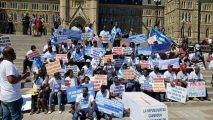3, October 2024
Ambazonia Uprising: Ground Zero fighters are losing diaspora financial support 0
Financial support for armed separatist activities in the North West and South West regions has “declined over time,” largely due to government actions, according to a report by the Global Initiative Against Transnational Organized Crime and Armed Conflict Location and Event Data (Acled).
The report which examines the separatist conflict, notes that the Cameroonian government intensified its monitoring of financial flows between the diaspora and armed groups starting in 2019, two years after the conflict began.
“As a representative for the Agence Nationale d’Invéstigation Financière (ANIF), the Cameroonian national financial crime agency explained, the government realized that separatist armed groups tended to collect their transfers in the early morning or late evening, and security forces began monitoring pickups at these times, which led to numerous arrests,” the report indicates.
According to the report, the government’s crackdown involved tracking financial movements. This tracking led to “serious consequences for some of the individuals involved.” For instance, one person was arrested after security forces examined his bank account, which revealed a transfer from the diaspora, resulting in his imprisonment at Douala New Bell prison.
However, tighter monitoring of financial flows isn’t the only factor behind the dwindling financial support. The report highlights a loss of trust among members of the Anglophone diaspora, driven by suspicions of embezzlement and the opaque use of funds by some well-known separatist leaders. Many donors, initially under the impression they were funding humanitarian efforts, were disillusioned upon discovering their contributions were being diverted to fund armed conflict. “Reportedly, many of the donors who had given money to activists fundraising for the separatist cause had been led to believe they were funding humanitarian, not militant efforts,” the report explains.
Another key factor in the decline of financial aid is the atrocities committed by separatists against civilians, which has repelled some financial backers. “A decline in the credibility of the diaspora leaders was an important factor in the decline of diaspora donations. However, this decline was also linked to a decline in the credibility of the armed groups themselves, particularly in regard to their treatment of civilians,” the report concludes.
In response to the reduced funding, armed separatists have turned to forced “taxation,” extortion, and kidnappings for ransom to sustain their activities.
Source: Business in Cameroon




























3, October 2024
Biya regime launches digital platform to verify diploma authenticity 0
On October 1, 2024, the Cameroonian government introduced a new digital platform aimed at verifying the authenticity of diplomas issued by universities, public administrations, and private institutions. The initiative was unveiled at the École Normale Supérieure (ENS) of the University of Yaoundé 1, during a ceremony co-chaired by the Minister of Higher Education (Minesup), Jacques Fame Ndongo, and the Minister of Public Service and Administrative Reform (Minfopra), Joseph Le.
The digital platform is described as an “essential tool” designed to streamline the often lengthy recruitment process within the public sector, which has been slowed by cumbersome diploma certification procedures. “This platform is not only a modern tool for verifying the authenticity of diplomas but also a guarantee of trust for citizens, employers, and especially public institutions,” said Joseph Le.
As per a joint circular from May 8, 2024, Minesup will provide Minfopra with a secure software interface, allowing access to diploma data. In return, Minfopra will be able to submit verification requests digitally, speeding up the process. A secure response confirming the authenticity of the diploma will then be sent back to Minfopra through the platform. According to Minister Le, the platform is “a crucial step” in the government’s commitment to enhancing transparency and efficiency in public administration. The initiative is part of a broader modernization effort to improve the management of civil servant integration processes.
The platform aims to address the growing issue of fake diplomas in both the public and private sectors. For example, in June 2024, Defense Minister Joseph Beti Assomo announced the discovery of 1,312 fake diplomas during the recruitment process for young gendarmes and soldiers for the 2024 fiscal year. Similarly, in 2022, nearly 1,000 gendarmerie students were dismissed due to falsified credentials. This new platform is expected to help decrease such incidents by streamlining document verification.
The platform’s launch follows an agreement signed between Minesup and Minfopra on April 6, 2023. It will be implemented in collaboration with the ministries that issue the most diplomas, including Minesup, the Ministry of Secondary Education (Minesec), the Ministry of Basic Education (Minedub), and the Ministry of Employment and Vocational Training (Minefop). Through this initiative, Minfopra aims to verify diploma authenticity more effectively and significantly reduce the processing times for recruitment and certification.
Source: Business in Cameroon